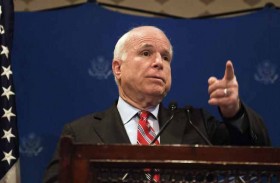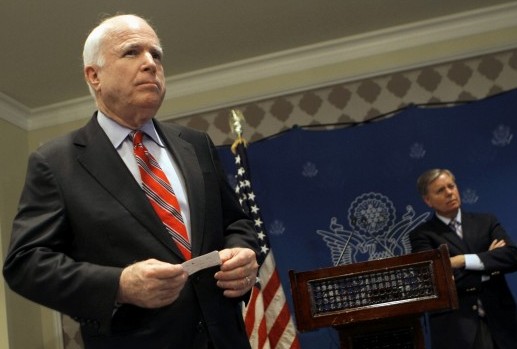 The Obama administration’s efforts to promote democracy in Egypt are being complicated by what many Egyptians see as mixed and confusing messages coming from Washington, exacerbating already high anti-American sentiment and threatening broader U.S. goals in the region. Any administration might find it difficult to safely navigate the intricacies of Egypt’s current political tumult, but some U.S. officials concede they have been unable to communicate a coherent policy. Officials also complain that their task has been made more challenging by the delicate line they must toe and by members of Congress who have inserted themselves into the high-wire diplomacy with one of America’s most important Arab allies. Egypt has been a cornerstone of Mideast stability for decades, notably because of its peace deal with Israel and its protection of the vital Suez Canal. The administration has been eager to remain engaged and influential there, but it is straddling a fine line, trying to balance its support for representative government with U.S. national interests. In Egypt’s crisis, the two do not meld well and staying involved has required what some see as a compromise in democratic principles. Several officials lamented that the White House’s nuanced policy is not easily explained to Egypt’s volatile public and wary leaders. And, they expressed frustration that the message has been muddled by the comments of lawmakers who have offered strident personal, opinions on the situation that do not hew to the administration’s line. The officials spoke only on condition of anonymity because they were not authorized to speak publicly about internal deliberations and differences the administration has with legislators. To begin with, they said, President Barack Obama’s approach to Egypt since the military’s July 3 toppling of President Mohammed Morsi, the country’s first freely elected leader, have appeared beset by uncertainty. For three weeks, administration lawyers and policymakers waffled on the question of whether Morsi’s ouster was a “coup,” a determination that under U.S. law would have forced a cutoff in $1.3 billion in annual military aid and a resulting loss of influence with the armed forces at a crucial time. In an unusual bit of legal gymnastics, Obama’s national security team determined it didn’t have to determine that either way. By declining to take a position, the administration infuriated Morsi’s Islamist supporters, who have refused to back down on demands that he be returned to power. At the same time, the administration drew the ire of the military and its supporters by continuing contacts with Morsi’s Muslim Brotherhood and sharply criticizing the tactics of security forces against protesters. Secretary of State John Kerry inflamed the already bubbling mistrust and suspicion by telling an interviewer last week in Pakistan that the Egyptian military had been “restoring democracy” by removing a democratically elected president. The remark drew an immediate and scathing response from the Brotherhood, and, a day later, Kerry tried to blunt the controversy by calling for all sides “to get back to a new normal.”
The Obama administration’s efforts to promote democracy in Egypt are being complicated by what many Egyptians see as mixed and confusing messages coming from Washington, exacerbating already high anti-American sentiment and threatening broader U.S. goals in the region. Any administration might find it difficult to safely navigate the intricacies of Egypt’s current political tumult, but some U.S. officials concede they have been unable to communicate a coherent policy. Officials also complain that their task has been made more challenging by the delicate line they must toe and by members of Congress who have inserted themselves into the high-wire diplomacy with one of America’s most important Arab allies. Egypt has been a cornerstone of Mideast stability for decades, notably because of its peace deal with Israel and its protection of the vital Suez Canal. The administration has been eager to remain engaged and influential there, but it is straddling a fine line, trying to balance its support for representative government with U.S. national interests. In Egypt’s crisis, the two do not meld well and staying involved has required what some see as a compromise in democratic principles. Several officials lamented that the White House’s nuanced policy is not easily explained to Egypt’s volatile public and wary leaders. And, they expressed frustration that the message has been muddled by the comments of lawmakers who have offered strident personal, opinions on the situation that do not hew to the administration’s line. The officials spoke only on condition of anonymity because they were not authorized to speak publicly about internal deliberations and differences the administration has with legislators. To begin with, they said, President Barack Obama’s approach to Egypt since the military’s July 3 toppling of President Mohammed Morsi, the country’s first freely elected leader, have appeared beset by uncertainty. For three weeks, administration lawyers and policymakers waffled on the question of whether Morsi’s ouster was a “coup,” a determination that under U.S. law would have forced a cutoff in $1.3 billion in annual military aid and a resulting loss of influence with the armed forces at a crucial time. In an unusual bit of legal gymnastics, Obama’s national security team determined it didn’t have to determine that either way. By declining to take a position, the administration infuriated Morsi’s Islamist supporters, who have refused to back down on demands that he be returned to power. At the same time, the administration drew the ire of the military and its supporters by continuing contacts with Morsi’s Muslim Brotherhood and sharply criticizing the tactics of security forces against protesters. Secretary of State John Kerry inflamed the already bubbling mistrust and suspicion by telling an interviewer last week in Pakistan that the Egyptian military had been “restoring democracy” by removing a democratically elected president. The remark drew an immediate and scathing response from the Brotherhood, and, a day later, Kerry tried to blunt the controversy by calling for all sides “to get back to a new normal.”

Aug92013
